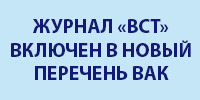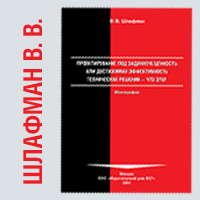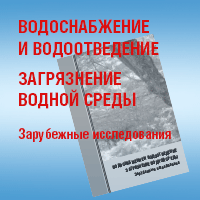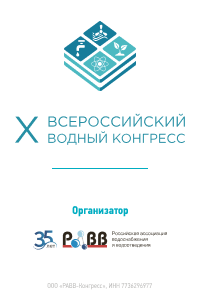№6|2025
WASTEWATER SYSTEMS
UDC 628.221
DOI 10.35776/VST.2025.06.02
Justification of the optimum alternative of the wastewater disposal system of St. Petersburg adapting to the conditions of the joint effectof urbanization and climate change
Part 4. Justification of the type of model for the management
of a wastewater disposal system
Summary
As follows from the economic comparison, the optimal option for adapting the wastewater disposal system to the conditions of the combined impact of urbanization and climate change St. Petersburg is a combination of «gray» technologies and an automated control system (ACS). Elements of «gray» technologies, in particular, include the construction of intermediate storage tanks and flow redistribution nodes between basins. An ACS with intermediate storage tanks and water outlets control in real time (Real Time Control, RTC) is a proven approach to reducing flooding and raw wastewater spills. The method for developing RTC strategies involves two main stages. The first stage is defining controlled sub-basins equipped with control points and spill points. At the second stage, the data of these subsystems (sub-basins) and their interrelations are used to develop control algorithms. For subjective and objective reasons implementing this approach in the conditions of the Russian Federation and St. Petersburg is virtually impossible. One way out of this situation is using artificial neural networks as a control model that can provide for the speed of analysis, generalization ability and high fault tolerance required for the effective implementation.
Key words
surface runoff disposal system , flooding , adaptation measures , automated wastewater management system
For citation: Volkov S. N., Luk’ianchuk M. Iu., Zhukova A. G., Solokhin A. A., Kuz’min V. A., Zhitenev A. I., Rublevskaia O. N., Gvozdev V. A., Erofeev V. V., Kostenko I. G., Ignatchik V. S., Ignatchik S. Iu., Kuznetsova N. V., Seniukovich M. A., Eshchenko A. N. Justification of the optimum alternative of the wastewater disposal system of St. Petersburg adapting to the conditions of the joint effect of urbanization and climate change. Part 4. Justification of the type of model for the management of a wastewater disposal system. Vodosnabzhenie i Sanitarnaia Tekhnika, 2025, no. 6, pp. 9–18. DOI: 10.35776/VST.2025.06.02. (In Russian).
The further text is accessible on a paid subscription.
For authorisation enter the login/password.
Or subscribe
Список цитируемой литературы
- Волков С. Н., Лукьянчук М. Ю., Жукова А. Г. и др. Обоснование оптимального варианта адаптации системы водоотведения Санкт-Петербурга к условиям совокупного влияния урбанизации и изменения климата. Часть 1. Программа-методика обоснования оптимального варианта // Водоснабжение и санитарная техника. 2025. № 3. С. 42–50. DOI: 10.35776/VST.2025.03.05.
Volkov S. N., Luk’ianchuk M. Iu., Zhukova A. G. et al. Justification of the optimum alternative of the wastewater disposal system of St. Petersburg adapting to the conditions of the joint effect of urbanization and climate change. Part 1. Program-method for justification of the optimal alternative. Vodosnabzhenie i Sanitarnaia Tekhnika, 2025, no. 3, pp. 42–50. DOI: 10.35776/VST.2025.03.05. (In Russian). - Волков С. Н., Лукьянчук М. Ю., Жукова А. Г. и др. Обоснование оптимального варианта адаптации системы водоотведения Санкт-Петербурга к условиям совокупного влияния урбанизации и изменения климата. Часть 2. Результаты обоснования оптимального варианта адаптации // Водоснабжение и санитарная техника. 2025. № 4. С. 28–35. DOI: 10.35776/VST.2025.04.04.
Volkov S. N., Luk’ianchuk M. Iu., Zhukova A. G. et al. Justification of the optimum alternative of the wastewater disposal system of St. Petersburg adapting to the conditions of the joint effect of urbanization and climate change. Part 2. Results of substantiation of the optimum alternative. Vodosnabzhenie i Sanitarnaia Tekhnika, 2025, no. 4, pp. 28–35. DOI: 10.35776/VST.2025.04.04. (In Russian). - Dirckx G., Schütze M., Kroll S. et al. RTC versus static solutions to mitigate CSO’s impact. 12nd International Conference on Urban Drainage, Porto Alegre/Brazil, 10–15 September 2011.
- Loucks E. D., Locke E. F., Heinz S. R., Vitasovic Z. C. A real-time control strategy for operating the Milwaukee Metropolitan Sewerage District (MMSD) conveyance and storage system. Proceedings of the 2004 World Water and Environmental Resources Congress: Critical Transitions in Water and Environmental Resources Management, June 27 – July 1, 2004, Salt Lake City, UT. Environmental and Water Resources Institute and American Society of Civil Engineers, Reston, VA.
- Pleau M., Colas H., Lavalle´e P. et al. Global optimal real-time control of the Quebec urban drainage system. Environmental Modelling and Software, 2005, v. 20, article id. 401e413.
- Vanrolleghem P. A., Benedetti L., Meirlaen J. Modelling and real-time control of the integrated wastewater system. Environmental Modelling and Software, 2005, v. 20, article id. 427e442.
- Vazquez J., Francois M., Gilbert D. Real-time management of a sewage system: verification of the optimality and applicability of graphical linear programming compared to mixed linear programming. Revue des Sciences de l’Eau, 2003, v. 16 (4), article id. 425e442 (article in French).
- Weyand M. Real-time control in combined sewer systems in Germany and some case studies. Urban Water Journal, 2002, v. 4 (4), article id. 347e354.
- Волков С. Н., Лукьянчук М. Ю., Жукова А. Г. и др. Обоснование оптимального варианта адаптации системы водоотведения Санкт-Петербурга к условиям совокупного влияния урбанизации и изменения климата. Часть 3. Оценка экономической эффективности автоматизированной системы управления водоотведением // Водоснабжение и санитарная техника. 2025. № 5. С. 39–46. DOI: 10.35776/VST.2025.05.05.
Volkov S. N., Luk’ianchuk M. Iu., Zhukova A. G. et al. Justification of the optimum alternative of the wastewater disposal system of St. Petersburg adapting to the conditions of the joint effect of urbanization and climate change. Part 3. Estimation of the economic efficiency of an automated wastewater management system. Vodosnabzhenie i Sanitarnaia Tekhnika, 2025, no. 5, pp. 39–46. DOI: 10.35776/VST.2025.05.05. (In Russian). - Schütze M., Erbe V., Haas U. et al. Sewer system real-time control supported by the m180 guideline document. Urban Water Journal, 2008, v. 5 (1), pp. 69–78.
- Dirckx G., Schütze M., Kroll S. et al. Cost-efficiency of RTC for CSO impact mitigation. Urban Water Journal, 2011, v. 8 (6), pp. 367–377.
- Kroll S., Van Impe J., Willems P. A methodology for the design of RTC strategies for combined sewer networks. Water, 2018, v. 10 (11), 1675.
- Schütze M., Campisano A., Colas H. et al. Real time control of urban wastewater systems – where do we stand today? Journal of Hydrology, 2004, v. 299, pp. 335–348.
- Bach P. M., Rauch W., Mikkelsen P. S. et al. A critical review of integrated urban water modelling – Urban drainage and beyond, Environmental Modelling and Software, 2014, v. 54, pp. 88–107.
- Pu W., Lemmon M. D. Distributed flow control using embedded sensor networks and actuators to reduce combined sewer overflow events (CSO). In Proceedings of the 46th IEEE Conference on Decision Making and Management. December 12–14, 2007, New Orleans, Louis.
- Reghaber T. P., Talley J. V. Detection and control of combined sewer overflow events using built-in sensor network technology. In the Effects of global climate change. American Society of Engineers, 2005, pp. 1–12.
- See C. H., Khoroshenkov K. V., Ali M. T. B., Tait S. J. Acoustic sensor of the combined sewer overflow screen (CSO) monitoring in the drainage infrastructure. Sensors, 2021, v. 21 (2), 404.
- Montestruk L. CSOnet: a wireless network of sensors and actuators on an urban scale. MD Lemmon Department of Electrical Engineering, University of Notre Dame. 2008.
- EurEau. Europe’s water in figures: An overview of the European drinking water and waste water sectors (9782960222630). 2021.
- Ahammed F. A review of water-sensitive urban design technologies and practices for sustainable stormwater management. Sustainable Water Resources Management, 2017, v. 3 (3), pp. 269–282.
- Botturi A., Ozbayram E. G., Tondera K. et al. Combined sewer overflows: A critical review on best practice and innovative solutions to mitigate impacts on environment and human health. Critical Reviews in Environmental Science and Technology, 2020, v. 51 (15), pp. 1585–1618.
- Imran H. M., Akib S., Karim M. R. Permeable pavement and stormwater management systems: A review. Environmental Technology, 2013, v. 34 (17–20), pp. 2649–2656.
- Shishegar S., Duchesne S., Pelletier G. Optimization methods applied to stormwater management problems: A review. Urban Water Journal, 2018, v. 15 (3), pp. 276–286.
- Creaco E., Campisano A., Fontana N. et al. Real time control of water distribution networks: A state-of-the-art review. Water Research, 2019, v. 161, pp. 517–530.
- Lund N. S. V., Falk A. K. V., Borup M. et al. Model predictive control of urban drainage systems: A review and perspective towards smart real-time water management. Critical Reviews in Environmental Science and Technology, 2018, v. 48 (3), pp. 279–339.
- Daal P., Gruber G., Langeveld J. et al. Performance evaluation of real time control in urban wastewater systems in practice: Review and perspective. Environmental Modelling and Software, 2017, v. 95, pp. 90–101.
- Werf J. A., Kapelan Z., Langeveld J. Towards the long term implementation of real time control of combined sewer systems: A review of performance and influencing factors. Water Science and Technology, 2022, v. 85(4), pp. 1295–1320.
- Wang X., Xie H. A review on applications of remote sensing and geographic information systems (GIS) in water resources and flood risk management. Water, 2018, v. 10 (5), 608.
- Lund N. S. V., Falk A. K. V., Borup M. et al. Model predictive control of urban drainage systems: A review and perspective towards smart real-time water management. Critical Reviews in Environmental Science and Technology, 2018, v. 48 (3), pp. 279–339.
- Campisano A., Cabot Ple J., Muschalla D. et al. Potential and limitations of modern equipment for real time control of urban wastewater systems. Urban Water Journal, 2013, v. 10, pp. 300–311.
- Vitasovich Z. K. Real-time management of urban drainage networks. Washington, DC, USA: The United States Environmental Protection Agency (US EPA) and the Office of Research and Development, 2006.







